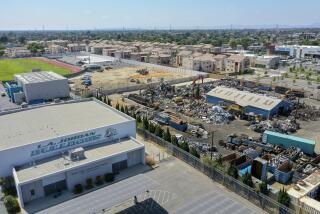No Imminent Threat Found at Rocky Flats : But Energy Dept. Study Raises Doubts on Plant’s Nuclear Waste Disposal
- Share via
WASHINGTON — The Rocky Flats nuclear arms plant, which is under investigation by the FBI for possible criminal violation of environmental laws, poses no imminent threat to public health, the Energy Department concluded in a study released Thursday.
The report raised doubts, however, about the accuracy of measured concentrations of plutonium in the air surrounding the 364-acre manufacturing complex near Denver. It said the air samplers are out-of-date, prone to breakdowns and not properly located.
The report, based on a six-week investigation by Energy Department experts, cited a series of weaknesses in Rocky Flats programs aimed at identifying and correcting serious environmental problems at the plant.
Study Begun in June
Energy Secretary James D. Watkins ordered the special assessment of conditions at Rocky Flats on June 6, the same day that dozens of FBI agents and Environmental Protection Agency investigators raided the plant looking for evidence of illegal dumping and incineration of hazardous wastes. A special grand jury was impaneled in Denver on Aug. 1 but has not issued any indictments.
Henson Moore, the deputy energy secretary, told a Senate committee Thursday that the FBI has provided no information about its investigation. He said it had promised to alert the department to any health-threatening conditions it might find.
At a separate congressional hearing, George B. Merrick, vice president of Rockwell International Corp., which earlier this month agreed to withdraw as manager of Rocky Flats, said his company also had been unable to get information on the FBI probe.
The separate Energy Department investigation was concluded July 21.
“No situations which pose an imminent threat to public health or the environment were observed,” the report said.
The highly technical documentation provided in the report painted a picture of deep-rooted problems in management of Rocky Flats, including poor communication and planning, a lack of quality assurance and the absence of a comprehensive strategy for bringing the plant into compliance with state and federal environmental laws.
List of Findings
Among the investigators’ findings:
--The plant’s method of monitoring emissions into the open air from exhaust ducts are deficient. These flaws “may adversely affect determination of radioactive materials released into the atmosphere,” including plutonium, it said.
--No soil samples were taken after the release June 3 of a fluid containing the hazardous material polychlorinated biphenyl. PCBs were banned by the government in the 1970s after laboratory tests determined they caused cancer in animals, although the material is still in widespread use in electric transformers.
--Bags of asbestos-containing materials are not covered with soil after being dumped in landfills. Asbestos is a fibrous material suspected of causing lung disease.
--There are no formal procedures in place to minimize the risk of spills and overflows during transfers of materials from underground storage tanks. There also is no written procedure for requiring constant monitoring of such transfers.
--Discharges from a cooling tower are allowed to form a pool of standing water in a courtyard between buildings. Eventually this water percolates into the ground, carrying with it any contaminants that could enter the ground water.
More to Read
Sign up for Essential California
The most important California stories and recommendations in your inbox every morning.
You may occasionally receive promotional content from the Los Angeles Times.













